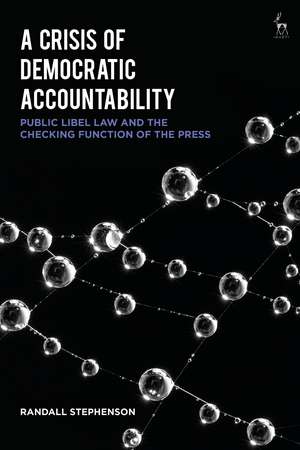A Crisis of Democratic Accountability: Public Libel Law and the Checking Function of the Press
Autor Dr Randall Stephensonen Limba Engleză Paperback – 4 noi 2020
| Toate formatele și edițiile | Preț | Express |
|---|---|---|
| Paperback (1) | 251.39 lei 6-8 săpt. | |
| Bloomsbury Publishing – 4 noi 2020 | 251.39 lei 6-8 săpt. | |
| Hardback (1) | 511.57 lei 6-8 săpt. | |
| Bloomsbury Publishing – 25 iul 2018 | 511.57 lei 6-8 săpt. |
Preț: 251.39 lei
Preț vechi: 322.94 lei
-22% Nou
Puncte Express: 377
Preț estimativ în valută:
48.11€ • 49.92$ • 40.21£
48.11€ • 49.92$ • 40.21£
Carte tipărită la comandă
Livrare economică 17-31 martie
Preluare comenzi: 021 569.72.76
Specificații
ISBN-13: 9781509943708
ISBN-10: 1509943706
Pagini: 272
Dimensiuni: 156 x 234 mm
Greutate: 0.39 kg
Editura: Bloomsbury Publishing
Colecția Hart Publishing
Locul publicării:London, United Kingdom
ISBN-10: 1509943706
Pagini: 272
Dimensiuni: 156 x 234 mm
Greutate: 0.39 kg
Editura: Bloomsbury Publishing
Colecția Hart Publishing
Locul publicării:London, United Kingdom
Caracteristici
An excellent comparative study of the public interest and political speech defences in defamation law, particularly from the perspective of the misuse of democratic free expression justifications, in the UK, Australia, New Zealand, Canada and the United States.
Notă biografică
Randall Stephenson is a scholar of defamation law and public law. He completed his DPhil in law at the University of Oxford in 2017. Before attending Oxford, he studied first amendment jurisprudence at Columbia University (LLM) and practiced litigation at Osler, Hoskin & Harcourt LLP in Toronto, Canada.
Cuprins
Part A: Introduction to the Problem of Public Libel LawOverview of Part A 1. Balancing Freedom of Expression and Reputation in Constitutional Context I. Defamation's Moving Target: Balancing Free Expression and Reputation II. Overview of Public Libel Doctrine III. Continuum of Doctrinal Solutions IV. Public Libel Law's Theory-Doctrine Rift V. Chapter Conclusion 2. Methodological Barriers to Democratic Theorising I. Overview II. Methodological Barrier IIII. Democratic Theorising in Public Libel Jurisprudence IV. Methodological Barrier II V. Moving Forward Part B: Undertheorising Democratic Accountability: Comparative Law Analysis of Public Libel DoctrineOverview of Part B 3. Indeterminate Balancing in Public Libel Doctrine: Generic Rules and 'Implied Rights' I. United States II. Australia III. Chapter Conclusion 4. Overlooking the Checking Function of the Press I. Overview II. Strasbourg Jurisprudence III. United Kingdom IV. New Zealand V. Chapter Conclusion 5. Conflating Meiklejohnian Theory and the Checking Function of the Press I. Overview II. United Kingdom III. Canada IV. Chapter Conclusion Part C: Reasserting Democratic AccountabilityOverview of Part C 6. Distinguishing the Checking Function from Meiklejohnian Theory: Lessons from Public Accountability and Neo-Republicanism I. Confronting a Conceptual Stalemate: 'Representation' and 'Accountability' II. Public Accountability Scholarship III. Neo-Republicanism: A Return to Institutional Design IV. Chapter Conclusion 7. A Revised Analytical Framework: Accountability Dysfunctions, Public Libel Doctrine, and the Institutional Press I. Overview II. Accountability Dysfunctions III. The Institutional Press as a Horizontal Accountability Mechanism IV. Public Libel Doctrine: Balancing Reputation and Freedom of Expression in Contemporary Democracies V. Chapter Conclusion Part D: Restoring Democratic AccountabilityOverview of Part D 8. Assessing Britain's Political Accountability Profile I. Selecting a Law Reform Candidate II. Britain's Primary Accountability Mechanisms III. Britain's Secondary Accountability Mechanisms IV. Chapter Conclusion 9. Reinstating the Checking Function in Britain's Constitutional Context I. Law Reform Recommendations II. Discussion III. Chapter Conclusion Conclusion-Prospective Challenges to Public Libel Law Reform
